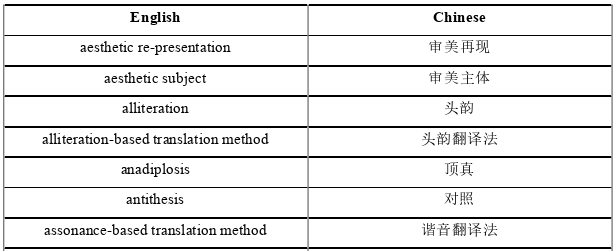联系方式
more本类最新英语论文
- 2024-07-19语言学硕士论文摘要中作者身..
- 2024-07-08中美媒体关于中国雾霾新闻报..
- 2024-07-01从译者主体性角度探究李尧文..
- 2024-06-26《拉米亚》中济慈对乌托邦思..
- 2024-05-27《发展中国家零碳船用燃料的..
- 2024-05-23语文学习词典中百科词汇的释..
- 2024-05-15《唯有我们》(节选)英汉翻..
- 2024-05-11央媒三农报道中“新农人”身..
- 2024-05-04译者行为批评理论视域下民俗..
- 2024-04-30中国文化形象的多模态隐喻建..
more热门文章
- 2011-02-25英语语言学动名词属性研究:..
- 2010-02-03美式英语与英式英语的区别
- 2010-02-09cultural difference betwe..
- 2010-02-26the relationship between ..
- 2009-04-06浅谈身势语-a brief discus..
- 2010-08-29study english idioms by w..
- 2010-02-03美国文化特征中俚语的研究分..
- 2010-02-11英式美式英语比较分析
- 2010-03-02on the origins of english..
- 2010-03-06the development and socia..
more留学论文写作指导
- 2024-05-14《反论》(节选)英汉翻译实..
- 2024-05-07《湖泊的一生》(节选)英汉..
- 2024-03-31卡森•麦卡勒斯小说中..
- 2024-03-28美国黑人女性心理创伤思考—..
- 2024-03-27乔治·艾略特《织工马南》中..
- 2024-03-21超越凝视:论《看不见的人》..
- 2024-03-19《哈克贝利•费恩历险..
- 2024-03-13心灵救赎之旅——从凯利的三..
- 2024-02-22文学地理学视角下的《印度之..
- 2023-05-03英、汉名词短语之形容词修饰..
翻译美学视域下中国外交话语音韵修辞的英译探讨
论文作者:留学生论文论文属性:硕士毕业论文 thesis登出时间:2023-08-10编辑:vicky点击率:743
论文字数:42522论文编号:org202308021104445262语种:英语 English地区:中国价格:$ 66
关键词:英语语言学
摘要:本文是一篇英语语言学论文,笔者认为目前学界对中国特色外交话语的翻译研究主要集中于探讨外交话语的翻译原则以及外交术语的翻译,较少关注外交语境中修辞的翻译研究。
本文是一篇英语语言学论文,本文以翻译美学为理论指导,从外交学、翻译学、音韵学等多学科交叉的视角出发,结合外交话语经典翻译实例,全面、客观地分析中国特色大国外交话语中音韵修辞的审美主体以及审美客体的主要类型、文体特征和话语功能,并在此基础上探讨外交音韵修辞的复合性翻译原则——政治等效+音韵美再现(PEPR)及其翻译策略与方法。
Chapter One Introduction
1.1 Research Background

With the development of China’s national strength and the continuous expansion of global influence, the integration of construction, translation, and communication of diplomatic discourse has become a major topic of concern to relevant government agencies and think-tanks scholars. The significance of the topic has grown unprecedentedly prominent especially after the 18th CPC National Congress, and now we have the goal to intensify our international discourse power and strengthen our cultural soft power. It is essential to “enhance our foreign-oriented publicity work through trying methods with new concepts, domains and expressions that are understood by both China and the rest of the world, telling the true story of China and making our voices heard” (Xi, 2014: 175). The C-E translation of diplomatic discourse with Chinese characteristics plays a key role in the spread of China’s true stories and voices, thus helping the dissemination of China’s diplomatic thoughts and concepts to the international community and the enhancement of China’s international influence.
Among the many branches of the studies on diplomatic discourse translation, the use of phonological rhetorical devices largely employed in the diplomatic context is a unique language phenomenon and reflects the diplomatic language art with Chinese characteristics. However, it appears that it has been attached less importance by translation scholars due to the complexity and particularity of the context in which the figure of speech is located. Traditionally, phonological rhetorical devices have been merely limited to the genre of poetry in literature. In fact, diplomatic phonological expressions, deeply rooted in Chinese language and culture, also have special discursive functions in conveying globally the diplomatic attitudes towards international affairs and issues.
1.2 Research Purpose
In recent years, China, a major country that has been receiving growing international attention, has offered lots of Chinese wisdom and approaches such as “global community with a shared future” and “the Belt and Road Initiative” for global governance and expounded the views and propositions of China on various major international issues facing mankind. Chinese diplomatic discourse contains a variety of phonological rhetorical expressions with Chinese language characteristics, such as “共商共建共享” “航行自由而不是横行自由” and “喊破嗓子不如甩开膀子”. These phonological expressions in a unique linguistic form produce a great musical effect and emotive meaning and play an important role in delivering China’s diplomatic ideas and its positions. Therefore, in the process of translating, diplomatic translators should try their best to reproduce the musical effects of these phonological expressions to enhance the communication of Chinese diplomatic discourse.
However, the translation of diplomatic phonological rhetorical devices is limited by various objective factors. First, Chinese and English language systems are quite different. The former belongs to the Sino-Tibetan family of ideographic characters, while本论文由英语论文网提供整理,提供论文代写,英语论文代写,代写论文,代写英语论文,代写留学生论文,代写英文论文,留学生论文代写相关核心关键词搜索。

 英国
英国 澳大利亚
澳大利亚 美国
美国 加拿大
加拿大 新西兰
新西兰 新加坡
新加坡 香港
香港 日本
日本 韩国
韩国 法国
法国 德国
德国 爱尔兰
爱尔兰 瑞士
瑞士 荷兰
荷兰 俄罗斯
俄罗斯 西班牙
西班牙 马来西亚
马来西亚 南非
南非






